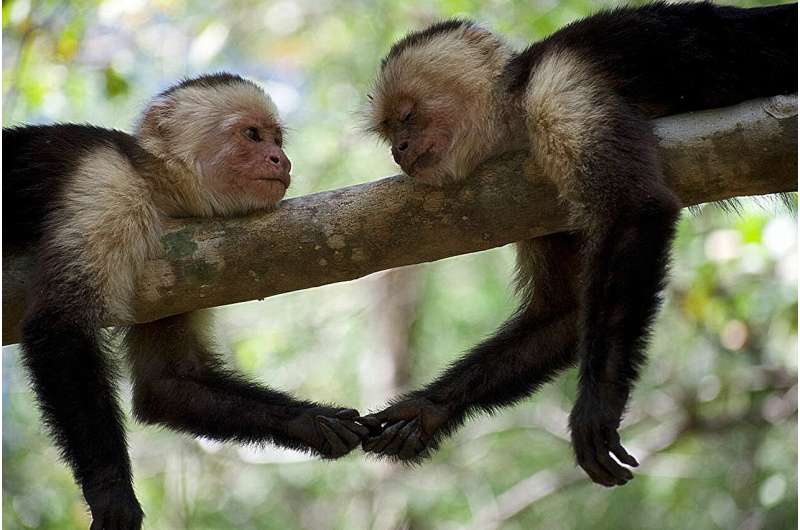Edit Content
Trending






A few things come to mind when we imagine the alpha male type. They’re the ones calling the shots, who get all the girls. But there’s a downside to being a strong and powerful alpha stud—at least if you’re a baboon.
Studies show that despite their high rank, the number one males in baboon society are also some of the most stressed-out, as measured by their high levels of glucocorticoids, the hormones involved in the fight-or-flight response.
But the leaders’ stress burden comes from a surprising source. New research reveals it’s not the time they spend fighting with other males that raises their stress hormone levels. Instead, it’s the effort they put into their mates.
That’s according to a new study of wild baboons in Kenya led by Duke University professor Susan Alberts with Catherine Markham at Stony Brook University, as well as senior research scientist Laurence Gesquiere of Duke.
The findings are published in the journal Proceedings of the Royal Society B: Biological Sciences.
As anyone who has climbed the career ladder knows, leaders can face many sources of stress: office politics, tough decisions, the constant pressure to perform.
Alpha male baboons may not have deadlines to meet, but it doesn’t mean their lives are stress-free, the researchers said.
To reach the top spot and stay there, male baboons must rely on their strength and battle skills to jockey for position and earn their place. The dominant male in a group also jealously guards his right to mate, closely monitoring females during their fertile periods and following them around for days at a time to make sure he is the one who fathers any offspring.
Since 1971, researchers have monitored individual wild baboons in southern Kenya on a near-daily basis, keeping careful track of their social interactions and other behavior over their lifetimes as part of the Amboseli Baboon Research Project.
One of the first hints that the top spot can pose distinct challenges for males came from a study Gesquiere and colleagues published in 2011, which revealed a striking pattern: Compared with non-leaders, alpha males had significantly higher levels of glucocorticoids.
When stress kicks in, the brain releases these and other hormones that mobilize energy to help the body cope with challenging situations.
In humans, “this response is activated for every kind of challenge we face, whether it’s running down the block because you’re late for a meeting, running a marathon, or going into a stressful meeting with your boss,” Alberts said.
But what exactly was fueling the baboons’ stress response was unclear.
In the new study, the researchers combined 14 years of behavioral records for 204 male baboons with data about their stress hormones, measured from droppings the animals left behind.
The results show, once again, that life is tough at the top. Glucocorticoid levels were 6% higher for alpha males than the rest of the ranks.
But the researchers also discovered a new clue—top-ranking males also had lower levels of a thyroid hormone called T3, indicating they are burning more calories than they’re taking in.
Discover the latest in science, tech, and space with over 100,000 subscribers who rely on Phys.org for daily insights. Sign up for our free newsletter and get updates on breakthroughs, innovations, and research that matter—daily or weekly.
“Being alpha really has energy consequences,” Gesquiere said.
The new study suggests it’s not the alpha male’s aggressive behavior—the time he spends fighting and letting everyone know he’s the boss—that’s taxing his energy reserves.
No matter how often the alpha males threatened, bullied, or pushed around other males, neither their stress hormones nor their thyroid hormones were affected.
“That was a big surprise,” Gesquiere said.
It may be that their flare-ups with other males are too subtle or short-lived to get to them, Alberts explained.
Or that once they get to the top, alpha males no longer need to be overtly aggressive to prove themselves. The alpha can scare other males away with merely a raised eyebrow or a flash of his fangs.
Instead, the researchers found the number one energy drain and source of stress for alpha male baboons was—you guessed it—their mates. Both their stress hormones and their thyroid hormones—indicators of their energy demands—directly correlated with the time they spent monopolizing fertile females.
“They’re essentially staking a claim; preventing other males from gaining access,” Alberts said.
Studies show all this attentiveness fragments their time and attention; making it harder to focus on finding their next meal.
“They’re constantly interrupted,” Alberts said. They’ll start to dig up or pry open a tasty morsel, “but then the female gets up and walks away, and they have to abandon it.”
Over time, the demands of being a top-ranking male may be harmful to their health. Previous studies of Amboseli baboons have found that top-ranking males age faster—as measured by chemical changes to their DNA—and live shorter lives than those with lower social standing.
Human hierarchies are more complicated, and so the implications for humans are less clear, Gesquiere said. We belong to multiple communities throughout our lives, each with its own social dynamics. Someone who’s a peon in the office may be a top player on the pickleball court, for example.
But for dominant male baboons, “stress definitely has long-term consequences,” Gesquiere said.
More information: Laurence R. Gesquiere et al, Energetic costs of social dominance in wild male baboons, Proceedings of the Royal Society B: Biological Sciences (2025). DOI: 10.1098/rspb.2024.1790
Provided by Duke University
Citation: Being a ladies’ man comes at a price for alpha male baboons (2025, January 22) retrieved 22 January 2025 from https://phys.org/news/2025-01-ladies-price-alpha-male-baboons.html
This document is subject to copyright. Apart from any fair dealing for the purpose of private study or research, no part may be reproduced without the written permission. The content is provided for information purposes only.
©2024. Livebuzznews. All Rights Reserved.